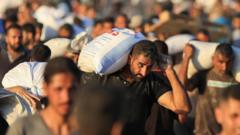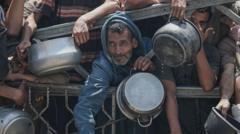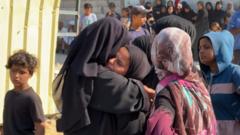UN-backed experts warn of an unfolding famine in Gaza, citing severe food shortages and rising malnutrition-related deaths. Calls for immediate humanitarian aid are made as ongoing hostilities and a blockade exacerbate the crisis.
UN Experts Sound Alarm Over Escalating Famine Crisis in Gaza

UN Experts Sound Alarm Over Escalating Famine Crisis in Gaza
A grim report highlights the growing humanitarian catastrophe in Gaza as famine thresholds are breached amid ongoing conflict and blockades.
The Integrated Food Security Phase Classification (IPC), a UN-backed initiative, has issued a dire warning stating that the "worst-case scenario of famine is currently playing out" in the Gaza Strip. This alarming alert reflects the deteriorating humanitarian conditions affecting the 2.1 million Palestinians, where widespread starvation, malnutrition, and disease are leading to an increase in hunger-related fatalities.
The latest findings from the IPC indicate that famine thresholds have been reached in food consumption rates across most of the Gaza Strip and acute malnutrition levels in Gaza City. In a stark assessment, the UN has already characterized the situation as man-made, mass starvation, reporting at least 63 malnutrition-related deaths this month alone. UN Secretary General António Guterres emphasized the gravity of the situation, asserting, "Palestinians in Gaza are enduring a humanitarian catastrophe of epic proportions." He called for a surge in aid, stating that the trickle of supplies must become an ocean to meet the urgent needs for food, water, medicine, and fuel.
The ongoing Israeli blockade of aid and commercial supplies, initiated in early March, has compounded the crisis. Although some easing of the blockade has occurred following international pressure, the situation remains critical, with civilian access to essential resources becoming increasingly erratic and dangerous. While Israel maintains there are no restrictions on aid and denies any starvation policies, the IPC insists that immediate measures must be taken to halt hostilities and enable an expansive, life-saving humanitarian response.
For a formal declaration of famine, specific criteria must be met: over 20% of households must be in IPC Phase 5, at least 30% of children must suffer from acute malnutrition, and starvation must account for two deaths per 10,000 inhabitants daily or four child deaths per 10,000 children. The IPC previously reported that 470,000 people in Gaza were already facing "catastrophic" levels of food insecurity.
As the conflict continues and pressure on Gaza's infrastructure mounts, malnutrition rates are escalating rapidly. Humanitarian organizations reveal that over 20,000 children have been treated for acute malnutrition in recent months. Compounding this, recent data points to alarming increases in hunger-related fatalities, particularly among children under the age of five.
The IPC's report calls for urgent action to alleviate the suffering of Gazans through restored services and unobstructed humanitarian access. It outlines the need for a ceasefire as a prerequisite to providing immediate relief before more lives are lost. The situation, as described by UN officials, is desperate. Widely acknowledged is the challenge of gathering accurate data given the chaos and collapsing health systems.
With further reports of malnutrition-related deaths, including in the last 24 hours, the humanitarian response is failing to meet the overwhelming needs of the population. The World Food Programme and Unicef have warned that current aid levels fall far short of requirements, highlighting an urgent need for continued aid delivery to prevent widespread starvation.
Israeli officials acknowledge the tough reality faced by Gaza yet attribute the suffering to Hamas. They report significant aid deliveries while residents contend that food shortages persist unabated. Reports describe attempts to secure basic food items being thwarted by looting and desperation, signaling a community pushed to its limits.
As the humanitarian crisis in Gaza escalates, global experts urge for immediate and unobstructed access to essential supplies, as time continues to run out for thousands caught in the grip of famine-like conditions.




















